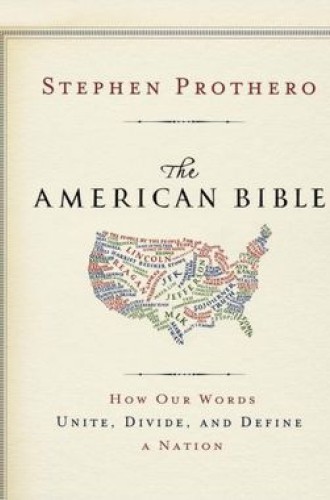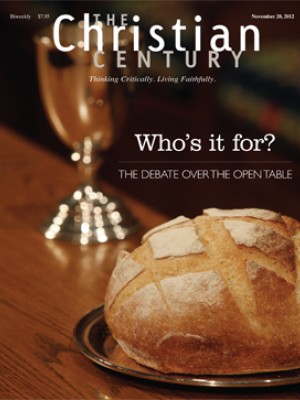American Talmud
The American Bible, Stephen Prothero’s latest assault on the best-seller lists, is a compendium of writings that, Prothero insists, together define Americans as a nation. “Words matter,” he tells us in the introduction, and conversations about our identity as a people are essential to our common life. “In every generation our pluribus threatens to overtake our unum,” he writes; “in every generation the nation must be imagined anew.”
Although Americans are not bound together by creed, they think of their nation as a religion of sorts. “The stories we tell about our nation are sacred stories,” he says. “The heroes we recall on our holy days are saints and martyrs, as ancient and permanent as granite on Mount Rushmore.” But just as the Bible, which is for many the foundational text of the United States, admits of many interpretations, so too have the writings of Americans themselves, from Thomas Jefferson to Martin Luther King Jr., engendered intense debate. This collection, then, in the tradition of Noah Webster’s readers, “is a record of what Americans value enough to fight about.”
Read our latest issue or browse back issues.
As befitting an American “Talmud” (Prothero’s term), The American Bible reproduces not only the original texts but also a representation of various interpretations. Prothero inventively organizes the writings into biblical categories: Genesis (works like Common Sense and the Declaration of Independence), Law (the Constitution and court decisions), Chronicles (novels), Psalms (music), Proverbs (such as “Give me liberty or give me death”), Prophets (Henry David Thoreau, Malcolm X and others), Lamentations (the Gettysburg Address), Gospels (political speeches), Acts of the Apostles (the Pledge of Allegiance) and Epistles (“Letter from Birmingham Jail”). He includes no apocalyptic writings, however.
Prothero offers a wide range of readings, illustrating how various people have appropriated fundamental American texts. Both John F. Kennedy and Ronald Reagan quoted Puritan John Winthrop’s “City upon a Hill” sermon, for example: Kennedy while assembling his administration, and Reagan during his 1980 debate with John B. Anderson (incorrectly identified here as “Jon Anderson”). Although Prothero doesn’t explain how or why Reagan appended the modifier shining to the phrase city upon a hill, he does quote Mario Cuomo and others who took issue with Reagan’s usage. Similarly, after reproducing the Declaration of Independence, Prothero includes the “Declaration of Sentiments” from the 1848 Seneca Falls Convention on women’s rights.
In the section titled “Law,” Prothero includes both the Constitution and its critics, principally the Confederates, who lamented the absence of any acknowledgment of God or designation of the United States as a “Christian nation,” and the National Reform Association, which sought unsuccessfully to remedy that. Prothero quotes Rousas John Rushdoony, the Christian Reconstructionist, arguing that the Constitution “was designed to perpetuate a Christian order,” but he curiously fails to mention the Mormon claim that the Constitution was divinely inspired.
In the “Chronicles” section, Prothero provides excerpts from Uncle Tom’s Cabin and Adventures of Huckleberry Finn. He wanted to include a third novel, Atlas Shrugged, Ayn Rand’s paean to individualism and, in Charles Colson’s words, “aggressive atheism,” and he crafted a fine introduction to it (including a prescient comment on the novel’s importance to Paul Ryan). Alas, the section set apart for the excerpt includes only this comment: “Permission to reprint was denied by the Estate of Ayn Rand.”
One measure of a book’s success is the extent to which it invites readers to weave their own stories into the narrative. Prothero’s inclusion of “God Bless America” reminded me of my first and only visit to Yankee Stadium several years after 9/11. When we sought to leave the blowout game in the middle of the seventh inning—the timing was coincidental and unplanned—yellow-shirted security guards, brandishing chains, blocked our exit until the 40,000-plus congregation had finished singing “God Bless America,” which includes the phrase, “Let us swear allegiance to a land that’s free.” Woody Guthrie’s “This Land Is Your Land,” as Prothero points out, was written in 1940 as a counterpoint to Irving Berlin’s composition. Guthrie’s guitar was emblazoned with the words, “This machine kills fascists.”
Some of Prothero’s selections are inspired, such as Thomas Jefferson’s letter to the Danbury Baptists, Reagan’s 1964 speech endorsing Barry Goldwater, and the rhetoric surrounding Maya Lin’s Vietnam Veterans Memorial in Washington, D.C. As befits a volume like this, Prothero maintains an even keel, betraying no outrage, for instance, over the hard right’s attempt in recent years to appropriate the legacy of Martin Luther King Jr., a man that conservatives excoriated as a communist radical.
Any compilation of this sort invites second guesses. What about Alexis de Tocqueville? Doesn’t Kennedy’s inaugural address—“Ask not what your country can do for you”—merit a fuller treatment than merely as a proverb? Kennedy’s September 12, 1960, address to the Greater Houston Ministerial Association about the relationship between faith and politics launched more than a decade of voter indifference to the religion of presidential candidates. This is the same speech that Rick Santorum, a fellow Roman Catholic, recently excoriated on the campaign trail.
I also wonder why in the midrash surrounding Roe v. Wade the author didn’t include Mario Cuomo’s 1984 landmark address at the University of Notre Dame, “Religious Belief and Public Morality.” Or, for that matter, the Southern Baptist Convention’s resolutions calling for the legalization of abortion, or evangelical statements in the immediate aftermath, lauding the Roe decision. Those might have shed light on how what was a Catholic issue in the early 1970s came to be adopted by the religious right as a signature concern in the late 1970s.
Prothero wants to view this compilation as a salve to the culture wars, and he exhibits a refreshingly naive confidence in the transformative power of primary sources. He asks: “Why allow John Boehner or Nancy Pelosi to dominate your book group when Jefferson, Lincoln, and King are in the room?”
Good question.






